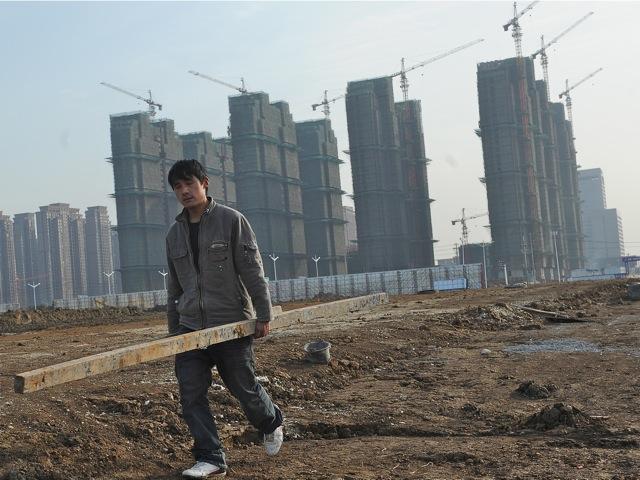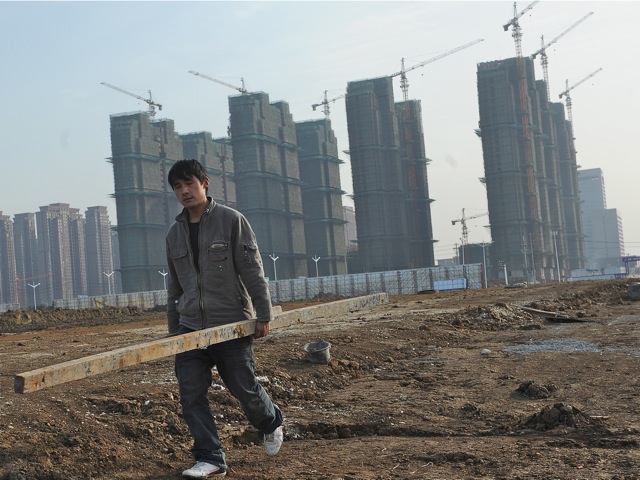Facing severe budget shortfalls, a number of local governments in China are attempting to sell large parcels of land in order to raise revenues, but not every region will be able to sell land.
Since last year, many regional governments have struggled with a slowing economy and rising debt. The real estate market, which had been booming prior to the global recession, has markedly worsened at a time when real estate is a much needed source of tax and land-sale revenues for local governments. The governments are facing numerous problems, with some even having trouble paying its employees.
Caixin Online reported that even the richest cities are in trouble. In Dongguan City in southern China’s Guangdong Province, where many factories that produce export goods are located, businessmen who once supported the city government are now asking for repayment. Factories are either not being paid, or not being paid in full for completed orders.
Only in the coastal cities where development has been good can the government sell land, said Cheng Xiaonong, a Chinese economist who resides in the United States.
“On a large scale, local governments in China are facing financial troubles. It says something about the overall economy,” Cheng added.
The affected areas include cities and townships in Beijing and Guangdong Province, China’s leading industrial zone, as well as other areas once booming due to exports, but that have recently fallen on difficult economic times.
Land sales are seen as the most effective way of raising money as the sums involved are large, and the money flows directly into the coffers of the local governments, but Cheng said that in less developed cities it is not easy to sell land.
“[To name an example], in Shaoyang City, Hunan Province, the unemployment rate is as high as 88 percent. No real estate company wants to buy land there because the houses won’t sell,” said Xiaonong.
Recently, expanding cities including Beijing and Wenzhou went to the market, trying to sell the largest land parcels ever.
The city government of Wenzhou, for example, offered 3,220 acres of land for sale in the last week of August. Eight hundred and sixty six acres were earmarked for new residential buildings, and 2,303 for commercial or mixed real estate, according to First Financial Daily (FFD), a state-run financial news website.
On Aug. 27, Hangzhou City also sold 456 acres of land located in the city center for 5.4 billion yuan (US$850 million). Five of the parcels were sold to the first bidder, according to regime mouthpiece Xinhua.
Beijing’s Land Reserve Center put up 11 land parcels for sale on the same day. Nine of them were for residential use. Bidding will start on Sept. 17. This is the third time since Aug. 17 that the Land Reserve Center has put up land for sale in Beijing.
Continuing that trend, another large offering on behalf of the Center is expected on Sept. 23, according to People’s Daily online.
Elsewhere, Shijiazhuang City’s Bureau of National Resources is accepting tender offers for land use permits for central areas.
In Hubei Province, Wuhan City will offer 36 land parcels for sale in an upcoming land auction.
In addition, Xiamen’s Bureau of Land Resources and its Bureau of Housing Authority will sell 17 land parcels at an investment fair on Sept. 7, said China Securities Journal.
The townships of Zhangmutou and Changpin, both located in Dongguan, are home to many investment projects from Hong Kong. Once dubbed “the little Hong Kong” along with Changpin, Zhangmutou’s government is now 2.3 billion yuan (US$362 million) in debt, while its yearly revenue is less than 436 million yuan, according to Apple Daily.
If the government cannot find a way to quickly raise revenues or secure loans, the township will soon be bankrupt, according to the report.
Given the difficult situation, local governments in China are discussing various options to raise money. Shenyang City, for example, tightened its regulations with respect to different fines and hopes to use fines to generate revenue.
Another example is Shenzhen, Guangdong Province, one of the first special economic zones (SEZ). In the coastal region that borders Hong Kong, the tax authority recently cut down employees’ wages.
The higher the position, the larger the cut, an employee told Caixin. The highest cut was as much as 5,000 yuan (US$787), he said. The average monthly salary in Guandong Province, where Shenzen is located, was only 3763 yuan (US$593) in 2011, according to Chinadaily.
Changpin, a suburb of Dongguan, shoulders a 2.2 billion yuan debt-load and only had 1 billion yuan of revenues last year, according to Apple Daily. Local officials have said publicly that Dongguan’s government is facing a critical financial situation.
The problems are not exclusive to the southern province of Guandong, however.
Further north and not far away from Shanghai in Jiangsu Province, Wuxi City’s government is having difficulty paying its employees, while some departments in Shandong Province recently sold government-owned cars to finance the deficit, according to Chinese state media reports.
Wenzhou, the coastal city south of Shanghai, needed to sell its land in August to plug revenue shortfalls. According to an insider cited by First Financial Daily, the government now hopes to raise money by selling land permits. Due to the difficult financial situation, an employee of the city’s taxation department said that the city delayed bonus payments to employees.
According to official documents, Zhejiang Province’s total revenue in the first half of 2012 was 195.7 billion yuan ($31 billion), a 4.4 percent increase. The growth is much lower than in previous years, where rates of 20 to 30 percent were the norm.
Read the original Chinese article.
The Epoch Times publishes in 35 countries and in 19 languages. Subscribe to our e-newsletter.





